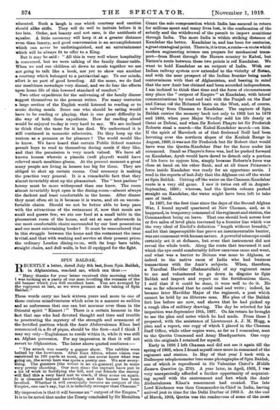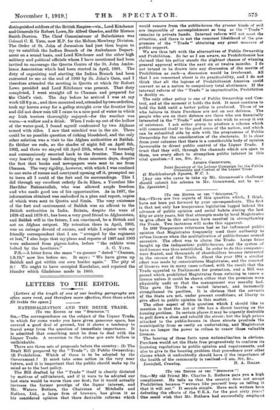SPIN BALDAK.
RECENTLY a letter, dated July 8th last, from Spin Baldak, in Afghanistan, reached me, which ran thus :— " Many thanks for your letter received this morning whilst was looking at a party of our men levelling the remains of the old bazaar which you will recollect here. You are avenged by the regiment at last, as we were present at the taking of Spin Baldak."
These words carry me back sixteen years and more to one of those curious misadventures which arise in a manner so sudden and so unforeseen that one can but murmur over them in the Oriental spirit " Kismet ! " There is a certain humour in the fact that one who had devoted thought and time and trouble to penetrating the mystery of the strength and armament of the fortified position which the Amir Abdurrahman Khan had commenced in a fit of pique, should be the first—and I think I may say only—Englishman to reside within it, while it was still an Afghan possession. For my impression is that it will not revert to Afghanistan. The letter above quoted continues :
" The attack was mostly a gunner show. The rabbits were bolted by the howitzers. After East Africa, where vision was restricted to 100 yards at most, and one never knew what was going on, the scrap here was quite a pretty one. We saw everything. The gunners [the writer is an ex-gunner] put in some very pretty shooting. Our mon since the capture have put in a lot of work in fortifying the hill, and our friends the enemy will find this a very hard nut to crack, if they came on again. It is cleansed beyond knowledge, and the bazaar has been levelled. Whether it will eventually become an outpost of the Empire, one can't say, but it is infinitely stronger than Chaman."
My impression is that it will become an " outpost of the Empire." It is to be noted that under the Treaty concluded by Sir Hamilton Grant the sole compensation which India has secured in return for millions spent and many lives lost, is the confiscation of the subsidy and the withdrawal of the permit to import munitions through India. The more India is within striking distance of Kandahar the better. Kandahar is, and has been for centuries, a great staategical point. There is, it is true, a route—a route which modern engineering science can prepare for mechanical transport—from Herat through the Hazer& country to Kabul, but Nature's route between these two points is vid Kandahar. We want to hold Kandahar as an outpost of India. With our Indian railway system now extended to the vicinity of Sistan, and with the near prospect of the Indian frontier being made conterminous with that of Afghanistan, and bearing in mind that the new Amir has claimed and been accorded independence, I am inclined to think that time and the force of circumstances may place the " outpost of Empire " at Kandahar, with lateral communications by road and rail with the Punjab on the East and Sistan vid the Helmund basin on the West, and, of courses a railway from Chaman to Kandahar. The capture of Spin Baldak carries the memory back not only to 1903 but to 1879 and 1880, when poor Major Waudby sold his life dearly at Gatai or Dobrai, and when Sir Robert Phayre let Sir Frederick Roberts steal a march—the Kabul-Kandahar march—on him. If the spirit of Havelock or of that firebrand Neill had been hovering over the northern slopes of the Kozhak Range in August, 1880, it was not Sir Frederick but Sir Robert that would have won the Quetta-Kandahar Star for the force under his command. Small as Phayre's force was, had he pushed forward on Kandahar, Ayub would have dared to detach only a portion of his force to oppose him, simply because Roberts's force was close at hand on his other flank, and at all times Primrose's force inside Kandahar was ready for an opportune sortie. I read in the reports of last July that the Afghans out off the water at Spin Baldak. Cutting off the water on the Chaman-Kandahar route is a very old game. I saw it twice cut off in AugustSeptember, 1880 ; whereas, had the Quetta column pushed straight on Kandahar, the water might have been left to take care of itself.
In 1897, for the first time since the days of the Second Afghan War, I found myself quartered at New Chaman, and, as it happened, in temporary command of the regiment and station, the Commandant being on leave. That one should look across four or five miles of level plain traversed by a frontier line which was the very ideal of Euclid's definition " length without breadth," and let that imperceptible line prove an insurmountable barrier, was not consonant with human nature. A powerful telescope could certainly set it at defiance, but even that instrument did not reveal the whole truth. Along the route that traversed it and which the eye could comfortably follow caravans came and went, and what was a barrier to Britons was none to Afghans, or indeed to the native races of India who had business transactions with the Andes subjects. When, therefore, a Yuzufzai Havildar (Rahmatultalt) of my regiment came to me and volunteered to go down in disguise to Spin Baldak and inspect and report on the fortifications there, I said that if it could be done, it were well to do it. He was so far educated that he could read and write ; indeed, he became later Havildar Major of the regiment, a post which cannot be held by an illiterate man. His plan of the Baldak fort lies before me now, and shows that he had picked up a rough idea of military drawing. The day he selected for his inspection was September 19th, 1897. On his return he brought to me the plan and notes which he had made. From these I prepared, with the assistance of Lieutenant A. J. M. Hogg, a plan and a report, one copy of which I placed in the Chaman Staff Office, while other copies were, as far as I remember, sent to the Quetta Command and Army Headquarters. One copy with the originals I retained for myself.
Early in 1898 I left Chaman and did not see it again till the spring of 1902, when I found myself once more in command of the regiment and station. In May of that year I took with a Dallmeyer telephotometer lens some photographs of Spin Baldak, one of which is reproduced in Sir Valentine Chirol's Middle Eastern Question (p. 270). A year later, in April, 1903, I was very unexpectedly afforded a further opportunity of acquainting myself with the cantonment and fort which the Amir Abdurrahman Khan's resentment had created. Tho late Lord Kitchener was then Commander-in-Chief in India, having arrived just in time for the Delhi Durbar of 1902-3. At the end of March, 1903, Quetta was the rendezvous of some of the most
distinguished soldiers of the British Empire—viz., Lord Kitchener and Generals Sir Robert Lowe, Sir Alfred Gaselee, and Sir Horace Smith-Dorrien. The Chief Commissioner of Baluchistan was Colonel C. E. Yate, now M.P. for the Melton-Mowbray Division. The Order of St. John of Jerusalem had just then begun to try to establish the Indian Branch of its Ambulance Department on a sound basis, and Lord Kitchener and the other high military and political officials whom I have mentioned had been invited to encourage the Quetta, Centre of the St. John Ambulance Association which had been started in April, 1901. The duty of organizing and .starting the Indian Branch had been entrusted to me at the end of 1900 by St. John's Gate, and I therefore attended the meeting in Quetta at which Sir Robert Lowe presided and Lord Kitchener was present. That duty completed, I went straight off to Chaman and prepared for the Chief's visit. The day before he arrived I was at my work till 6 p.m., and then mounted and, attended by two orderlies, took my horses away for a gallop straight over the frontier line and did not draw rein till I came to a nice pool of water in which my Irish terriers thoroughly enjoyed—for the weather was warm—a wallow and a drink. When I rode up out of the hollow of the water-pool, I found myself confronted by two Afghans armed with rifles. I saw that mischief was in the air. There could be no possible question of risking bloodshed, and the only other solution was a visit to the Afghan authorities at Baldak. So thither we rode, as the shades of night fell on April 6th, 1903, and there we stayed till April 25th, when I was formally and ceremoniously escorted back to the frontier. Time hung very heavily on my hands during those nineteen days, despite the fact that books and newspapers were sent to me from Chaman. The very rigidity, however, with which I was confined to one suite of rooms and courtyard opening off it, prompted me to learn all I could of the fort and its surroundings. This I did through my excellent orderly Za-in Khan, a Yuzufzai like Havildar Rahmatullah, who was allowed ample freedom and who made good use of his opportunities. As in 1897, the information obtained was embodied in a plan and report, copies of which were sent to Quetta and Simla. The very existence of the fort and cantonment of Baldak was an affront to the British authorities in India. Britain, despite the wars of 1838.42 and 1879-81, has been a very good friend to Afghanistan, and Baldak will in the future, I am convinced, be a British and not an Afghan outpost. My retention there in April, 1903, was an outrage devoid of excuse, and while I rejoice with my friendly correspondent that I am " avenged by the regiment at last," I also hope that my plans and reports of 1897 and 1903 were exhumed from pigeon-holes, before " the rabbits were bolted by the howitzers." A. C. YATE.
P.S.—A letter from the same " ex-gunner " dated " Chaman, 1.9.19," now lies before me. It says: "We have given up Baldak and got within our own border again." The pity of it ! We ought to have occupied Kandahar, and repaired the blunder which Gladstone made in 1880.







































 Previous page
Previous page